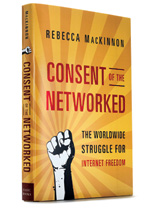
 Illustration by David Cowles
Illustration by David Cowles
 There's the law of the land, but what about cyberspace? Online censorship expert Rebecca MacKinnon talks shop about her new book, Consent of the Networked, which hits shelves January 31.
There's the law of the land, but what about cyberspace? Online censorship expert Rebecca MacKinnon talks shop about her new book, Consent of the Networked, which hits shelves January 31.
Q: Why Consent of the Networked? Until recently, we've looked at politics and power as something that happens in the physical world; we figured out governance by consent with the drawing up of the Magna Carta. Now we have this globally interconnected world with governments and companies acting as the sovereigns of cyberspace. But what we don't have is the consent of the governed.
Q: Who are these sovereigns? Companies we rely on like Google, Facebook, Comcast, Verizon, AT&T, Apple--they shape your digital experience. And the government sets up your Internet service provider to track and make sure you're not sharing files. They've created a surveillance system. As a chilling example, Amazon was hosting the WikiLeaks site and based on the political controversy, Amazon discontinued its relationship. But no one had proven that WikiLeaks had broken the law.
 Thomas Liggett
Thomas Liggett
Q: What would the Magna Carta 2.0 look like? Human rights in cyberspace are really no different from rights in the physical world. People need to engage in the politics of the Internet. As a citizen of a community, if you never vote or engage, don't be surprised when the outcome doesn't serve your interests; you've never done anything to push things in the right direction. It's the same with the Internet. The argument is less about saying, "I've written this document" and more about saying, "We need to hold the power holders accountable."
Q: How do we accomplish that? With acts of resistance. We need to fight to ensure that the Internet remains compatible with whistle-blowing and the type of political organizing that both governments and corporations tend to find threatening. Nick Merrill, who ran Calyx Internet Access, is an example. He received a sealed FBI order to hand over private account information for a user. He resisted and appealed to the ACLU to defend the rights to privacy; the FBI later dropped its demands. Similarly, in 2009, a group of Chinese bloggers worked to expose government software called Green Dam, which tracked users' actions. With the help of WikiLeaks, the government was eventually shamed into dropping the software program.
A version of this article appears in the December 2011/January 2012 issue of Fast Company.